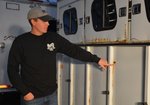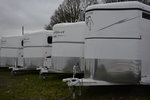

When it comes to transporting horses, having a working and adequate trailer is important to getting precious equine to and from different events and outings.
Although care of the animal itself is paramount, making sure the trailer hauling the horses won’t break down or be unusable for doing its chief job as a transport is important.
The most common mistake made by those purchasing a trailer is getting one too small for their animal or animals, Wayne Berry, owner of Double J Trailers in Woodland explained.
“Depending on the width of the trailer and the angle of the stalls … you can have two, two-horse bumper pulls and one can be significantly bigger,” Berry said.
He mentioned there have been times when less experienced horse owners make a trailer purchase only to find out their animal is too big to fit.
Berry estimated that more than 90 percent of his business is with horse trailers. Apart from looking at new trailer purchases, he also mentioned several key issues to look out for when it comes to used trailers.
Floors were a big concern, Berry said, saying it was important to make sure that if the trailer floor was wood it was not rotting from moisture, or in the case of an aluminum trailer the floor could be compromised from urine.
Compromised aluminum was something Berry said even more seasoned horse owners might not be aware of. Although the metal doesn’t rot or rust, acids in urine can corrode even their surfaces.
In the case of steel trailers, making sure there wasn’t any structural rust was another must-check item for used purchases Berry mentioned.
Another key area Berry said to look at was to make sure the running gear is in order, listing hard-to-detect bent axles as a possible complication.
Dealing with the unfortunate event of a breakdown along the side of the road was another issue Berry talked about, though depending on what was dysfunctional — the trailer or the tow vehicle — could add even more of a headache.
Having a tow vehicle breakdown could result in needing more than one other vehicle to help get off the highway, whether it be two tow trucks for each piece of the truck-trailer unit, or a tow truck and a working pickup that could haul off the trailer. Berry said it was important to make sure that if another truck is going to be taking on the trailer that it has a brake controller to be able to legally haul off the unit.
In terms of the trailer breaking down, Berry said that good tire condition was paramount to help prevent that being an issue. Having good tread on the tires is important, as is having tires less than four or five years old to avoid blowouts.
“A lot of horse trailers don’t get pulled very much, so they may have 70 or 80 percent tread, but the tires have been on there since the trailer was new; they might be 10-year-old tires,” Berry explained. “Although the tread looks good the sidewalls could blow out because the rubber rots, either from moisture or being exposed to sunlight.”
The trailer’s bearings should also be lubricated on a regular basis to make sure the wheels and mechanical parts of the trailer run smoothly, Berry added.
For those looking to insure their trailer, insurance on the unit itself is not required unless it is collateralized due to it being financed, Berry explained. The tow vehicle needs liability insurance according to state laws, though the trailer can be insured for collision or comprehensive, not liability. Berry said that generally insurance on the trailer comes from the same providers as auto insurers.